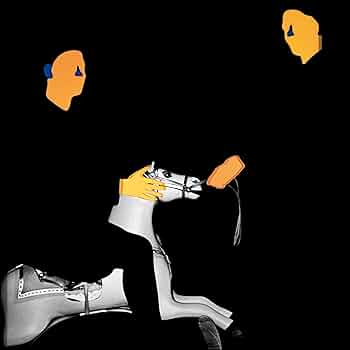
“Maybe I mistook pure distraction for a flash of love.”
I initially bounced off of MGMT’s Loss of Life pretty hard. Listened to it once or twice, didn’t gibe with its meandering song structures and synthesized brooding, nor its general lack of hooks and playfulness. A few catchy tunes (‘Mother Nature’ is the clear radio single, and ‘Bubblegum Dog’ could’ve been a David Bowie B-side) but nothing to rival the earworms from their earlier albums. Bandmates Andrew VanWyngarden and Benjamin Goldwasser have always tried to walk a tightrope, balanced between mainstream appeal and hinterland tinkering, and I quickly concluded that the gentle acoustic psych-rock the new inspirations and influences (house, glam, new wave, Britpop, The Flaming Lips, Beck) had coalesced into wasn’t something I was super interested in sinking my teeth into.
But weeks later I found myself humming a few stray lines and I returned, finding those same shaggy songs to be pleasurably layered in terms of instrumentation, sonic texture, and theme. Primary songwriter VanWyngarden used to write the vast majority of the band’s lyrics, but on Loss of Life Goldwasser is credited along with him on every song, and I think a large part of the album’s appeal stems from the duo finding a creative headspace unaffected by the neuroses that accompanied their early career fame and status. In approach it harkens all the way back to Oracular Spectacular—this is just two guys, free of market pressures, hanging out and playing together until something they vibe with starts to take form. The key point to keep in mind is that they’re not vibing with the juicy pop pastiche they were twenty years ago, that defined their biggest hits, which for better or worse still tend to be the measuring stick their output is judged against.
In strands of non-narrative poetry—scattershot rhymes mumbled out in the spirit of Destroyer mastermind Dan Behar—they sing about life showing them “things they can’t unsee,” biological “components breaking down,” and being “deceived by the gods.” Such evocative lines are interspersed with impenetrable absurdities as “igneous basketballs drifting through the heavens” and “Disney on Ice” to create a cryptic patchwork mythos akin to the prog rock concept albums of yore as the existentially-burdened narrators yearn for meaning and identity and connection to a tech-fazed modern world. Where they used to hide dark lyrics in sunny melodies (take another listen to ‘Time to Pretend’ if it’s been a while), here they couch optimism and fecund introspection in downbeat and dreary ones; most potently when the invoke the form of the power ballad and its paradoxical marriage of artifice and earnestness. They’re no longer about living free and dying young but about understanding themselves and raising children and pondering the mysteries of the human condition. Twenty years ago they intuited that the rockstar life was a hollow one and skewered it; now they have the life experience and emotional intelligence to mourn it even as they sidestep it to approach more meaningful subject matter.
While I’ve warmed up to the album considerably, the songs still meander and only occasionally resolve into transcendent high points the way similar organic experiments by Animal Collective, for instance, tend to come together. Album closer ‘Loss of Life’, a maximalist digital frenzy that owes a debt to Sufjan Stevens’ Age of Adz, succeeds in this regard, as do ‘Nothing Changes’, which contradicts its title with its slightly abrupt yet wonderful bridge of horns and kitschy synths after a homogenous few minutes of solemn acoustic chords, and ‘Dancing in Babylon’, which underscores its message of finding love in a fallen world with its driving electronic instrumentation.
In either case, the variegated soundscapes and vulnerable poetry do leave an impression. You’ll listen back to the same tracks you wrote off as repetitive, unmelodic, floating in chill stasis, and notice subtle nuances in the harpsichords, the horns, the choppy guitar solos, the airbrushed drum fills, the flute synths, and suddenly those unassuming melodies and that mosaic of rich images described by the lyrics will start to plant roots. Read as a narrative it’s incohesive, but considered purely for its ability to evoke emotions, it excels. “When the world is born and life is ending, then you learn to love your loss of life.”
After a modest career resurgence six years ago with the catchy Little Dark Age, fans seem to have been quick to dismiss Loss of Life as a relative failure. However, giving it some time to percolate has done wonders in the same way that it took a few spins to connect with Congratulations after the psych-pop bliss of Oracular Spectacular.
Favorite Tracks: Mother Nature; Dancing in Babylon; Bubblegum Dog; Nothing Changes; Loss of Life.